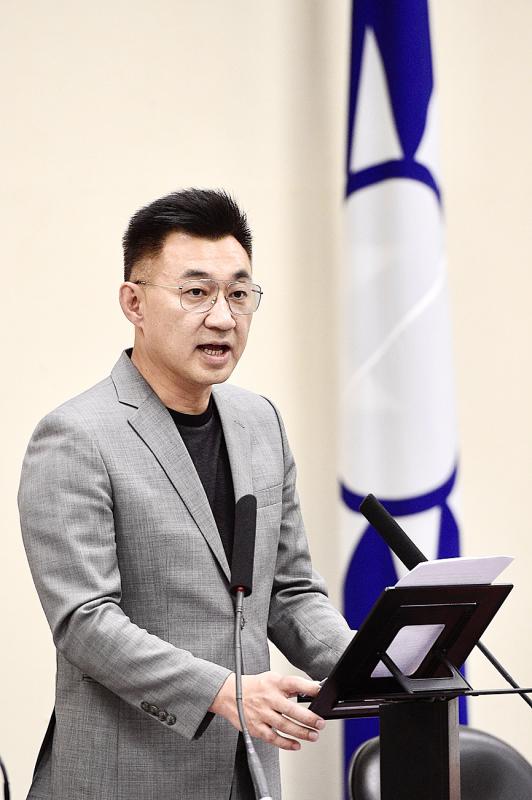The Chinese Nationalist Party (KMT) plans to propose constitutional amendments to require the president to give an annual state of the nation address to the Legislative Yuan and for the appointment of the premier to be approved by lawmakers, while working with other parties to ensure that the Control Yuan and the Examination Yuan can operate independently, KMT Chairman Johnny Chiang (江啟臣) said yesterday.
Presiding over the weekly meeting of the KMT’s Central Standing Committee, Chiang cited survey results from a my-formosa.com poll that found that 71.5 percent of the respondents support the idea of an annual presidential address on national policy issues and the economy to the legislature, while 62.8 percent said the president’s nomination of a premier should be approved by the legislature.
The same poll also found that 43.9 percent of respondents felt that the Democratic Progressive Party (DPP) has hurt the nation’s democratic system by the way it handled the nomination and approval of new Control Yuan members, he said.

Photo: George Tsorng, Taipei Times
About 52 percent said incoming Control Yuan president Chen Chu (陳菊) would not represent the people, he added.
“The basis for our discussions about the constitutional amendments should be to defend our democracy and crack down on the abuse of human rights,” Chiang said.
Under the Republic of China’s political system, the honor of the president is based on their exercising self-discipline, rather than on a balance of powers between the branches of government, he said.
As such, the president has many executive privileges, but bears no responsibility, he said.
The way the Control Yuan nominations were handled shows how a president can destroy the balance of power by a lack of self-discipline, he added.
While the KMT would petition the Council of Grand Justices for a ruling on the constitutionality of the approval of new Control Yuan member, it also plans to conduct a comprehensive review of the Constitution to ensure that the nation’s political system can hold the president accountable, prevent the abuse of executive rights and has a clear separation of powers, Chiang said.
The KMT needs to find the most advantageous position between the US and China, and develop its relations with both nations using a flexible foreign policy, given the conflicts between them, he said.
“President Tsai Ying-wen (蔡英文) had said that we should not forget we are one of the chess players as well. We want to remind Tsai that she should cautiously tread in diplomatic waters. Her priority should be an independent Republic of China and the nation’s 23 million people,” Chiang said.
“She should avoid turning Taiwan into a bargaining chip between the two countries — or an abandoned child,” the KMT chairman added.

A preclearance service to facilitate entry for people traveling to select airports in Japan would be available from Thursday next week to Feb. 25 at Taiwan Taoyuan International Airport, Taoyuan International Airport Corp (TIAC) said on Tuesday. The service was first made available to Taiwanese travelers throughout the winter vacation of 2024 and during the Lunar New Year holiday. In addition to flights to the Japanese cities of Hakodate, Asahikawa, Akita, Sendai, Niigata, Okayama, Takamatsu, Kumamoto and Kagoshima, the service would be available to travelers to Kobe and Oita. The service can be accessed by passengers of 15 flight routes operated by

Chinese spouse and influencer Guan Guan’s (關關) residency permit has been revoked for repeatedly posting pro-China videos that threaten national security, the National Immigration Agency confirmed today. Guan Guan has said many controversial statements in her videos posted to Douyin (抖音), including “the red flag will soon be painted all over Taiwan” and “Taiwan is an inseparable part of China,” and expressing hope for expedited reunification. The agency last year received multiple reports alleging that Guan Guan had advocated for armed reunification. After verifying the reports, the agency last month issued a notice requiring her to appear and explain her actions. Guan

GIVE AND TAKE: Blood demand continues to rise each year, while fewer young donors are available due to the nation’s falling birthrate, a doctor said Blood donors can redeem points earned from donations to obtain limited edition Formosan black bear travel mugs, the Kaohsiung Blood Center said yesterday, as it announced a goal of stocking 20,000 units of blood prior to the Lunar New Year. The last month of the lunar year is National Blood Donation Month, when local centers seek to stockpile blood for use during the Lunar New Year holiday. The blood demand in southern Taiwan — including Tainan and Kaohsiung, as well as Chiayi, Pingtung, Penghu and Taitung counties — is about 2,000 units per day, the center said. The donation campaign aims to boost

The Central Weather Administration (CWA) said a magnitude 4.9 earthquake that struck off the coast of eastern Taiwan yesterday was an independent event and part of a stress-adjustment process. The earthquake occurred at 4:47pm, with its epicenter at sea about 45.4km south of Yilan County Hall at a depth of 5.9km, the CWA said. The quake's intensity, which gauges the actual effects of a temblor, was highest in several townships in Yilan and neighboring Hualien County, where it measured 4 on Taiwan's seven-tier intensity scale, the CWA said. Lin Po-yu (林柏佑), a division chief at the CWA's Seismological Center, told a news conference